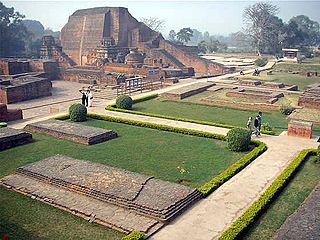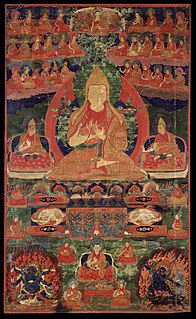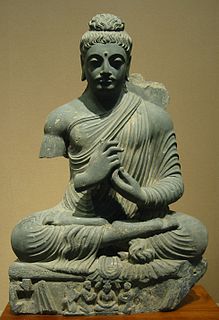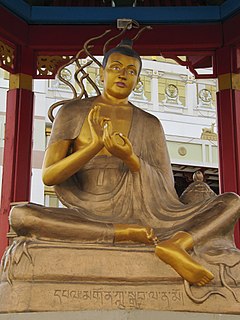
Buddhist philosophy refers to the philosophical investigations and systems of inquiry that developed among various Buddhist schools in India following the parinirvana of the Buddha and later spread throughout Asia. The Buddhist path combines both philosophical reasoning and meditation. The Buddhist traditions present a multitude of Buddhist paths to liberation, and Buddhist thinkers in India and subsequently in East Asia have covered topics as varied as phenomenology, ethics, ontology, epistemology, logic and philosophy of time in their analysis of these paths.

Nāgārjuna was an Indian Mahāyāna Buddhist thinker, scholar-saint and philosopher. He is widely considered one of the most important Buddhist philosophers. Jan Westerhoff considers him to be "one of the greatest thinkers in the history of Asian philosophy."

Tibetan Buddhism is the form of Buddhism practiced in Tibet and Bhutan, where it is the dominant religion. It also has adherents in the regions surrounding the Himalayas, in much of Central Asia, in the Southern Siberian regions such as Tuva, and in Mongolia.

Chandrakirti or "Chandra" was a Buddhist scholar of the madhyamaka school and a noted commentator on the works of Nagarjuna and those of his main disciple, Aryadeva. He wrote two influential works on madhyamaka, the Prasannapadā and the Madhyamakāvatāra.

The Gelug is the newest of the four major schools of Tibetan Buddhism. It was founded by Je Tsongkhapa (1357–1419), a Tibetan philosopher, tantric yogi and lama and further expanded and developed by his disciples.

Śūnyatā, translated most often as emptiness, vacuity, and sometimes voidness, is an Indian philosophical concept. Within Hinduism, Jainism, Buddhism and other philosophical strands, the concept has multiple meanings depending on its doctrinal context. It is either an ontological feature of reality, a meditative state, or a phenomenological analysis of experience.
Yogachara is an influential tradition of Buddhist philosophy and psychology emphasizing the study of cognition, perception, and consciousness through the interior lens of meditative and yogic practices. It is also variously termed Vijñānavāda, Vijñaptivāda or Vijñaptimātratā-vāda, which is also the name given to its major epistemic theory. There are several interpretations of this main theory; while often regarded as a kind of Idealism, critical scholars argue that it is closer to a kind of phenomenology or representationalism, aimed at deconstructing the reification of our perceptions.

Mādhyamaka, otherwise known as Śūnyavāda and Niḥsvabhāvavāda, refers to a tradition of Buddhist philosophy and practice founded by the Indian Buddhist monk and philosopher Nāgārjuna. The foundational text of the Mādhyamaka tradition is Nāgārjuna's Mūlamadhyamakakārikā. More broadly, Mādhyamaka also refers to the ultimate nature of phenomena as well as the non-conceptual realization of ultimate reality that is experienced in meditation.
The Mūlamadhyamakakārikā, abbreviated as MMK, is the foundational text of the Madhyamaka school of Mahāyāna Buddhist philosophy. It was composed by the Indian philosopher Nāgārjuna.

East Asian Madhyamaka refers to the Buddhist tradition in East Asia which represents the Indian Madhyamaka (Chung-kuan) system of thought. In Chinese Buddhism, these are often referred to as the Sānlùn school, also known as the "emptiness school", although they may not have been an independent sect. The three principal texts of the school are the Middle Treatise, the Twelve Gate Treatise, and the Hundred Treatise. They were first transmitted to China during the early 5th century by the Buddhist monk Kumārajīva (344−413) in the Eastern Jin Dynasty. The school and its texts were later transmitted to Korea and Japan. The leading thinkers of this tradition are Kumārajīva's disciple Sēngzhào, and the later Jízàng. Their major doctrines include emptiness (k'ung), the middle way (chung-tao), the twofold truth (erh-t'i) and "the refutation of erroneous views as the illumination of right views" (p'o-hsieh-hsien-cheng).

Tsongkhapa was an influential Tibetan Buddhist monk, philosopher and tantric yogi, whose activities led to the formation of the Gelug school of Tibetan Buddhism. He is also known by his ordained name Losang Drakpa or simply as "Je Rinpoche". He is also known by Chinese as Zongkapa Lobsang Zhaba or just Zōngkàbā (宗喀巴).

Dharmakīrti, was an influential Indian Buddhist philosopher who worked at Nālandā. He was one of the key scholars of epistemology (pramāṇa) in Buddhist philosophy, and is associated with the Yogācāra and Sautrāntika schools. He was also one of the primary theorists of Buddhist atomism. His works influenced the scholars of Mīmāṃsā, Nyaya and Shaivism schools of Hindu philosophy as well as scholars of Jainism.
The Svātantrika–Prāsaṅgika distinction is a doctrinal distinction made within Tibetan Buddhism between two stances regarding the use of logic and the meaning of conventional truth within the presentation of Madhyamaka.

Śāntarakṣita, whose name translates into English as "protected by the One who is at peace" was an important and influential Indian Buddhist philosopher, particularly for the Tibetan Buddhist tradition. Śāntarakṣita was a philosopher of the Madhyamaka school who studied at Nalanda monastery under Jñānagarbha, and became the founder of Samye, the first Buddhist monastery in Tibet.

Bhāviveka, also called Bhāvaviveka, and Bhavya was a sixth-century madhyamaka Buddhist philosopher. Alternative names for this figure also include Bhavyaviveka, Bhāvin, Bhāviviveka, Bhagavadviveka and Bhavya. Bhāviveka is the author of the Madhyamakahrdaya, its auto-commentary the Tarkajvālā and the Prajñāpradīpa.
Jeffrey Hopkins is an American Tibetologist. He is Emeritus professor of Tibetan and Buddhist Studies at the University of Virginia, where he taught for more than three decades since 1973. He has authored more than twenty-five books about Tibetan Buddhism, among them the highly influential Meditation on Emptiness, which appeared in 1983, offering a pioneering exposition of Prasangika-Madyamika thought in the Geluk tradition. From 1979 to 1989 he was the Dalai Lama's chief interpreter into English and he played a significant role in the development of the Free Tibet Movement. In 2006 he published his English translation of a major work by the Jonangpa lama, Dolpopa, on the Buddha Nature and Emptiness called Mountain Doctrine.
Anne Carolyn Klein is professor of Religious Studies at Rice University in Houston, Texas and co-founding director and resident teacher at Dawn Mountain, a Tibetan temple, community center and research institute.

The Tibetan Nuns Project is a non-profit organisation founded in 1987, which is dedicated to educating and supporting female Buddhist monastics in India from all Tibetan Buddhist lineages. It supports nuns interested in study and higher ordination. The mission of the Tibetan Nuns Project is to educate and empower nuns of the Tibetan Buddhist tradition as teachers and leaders and to establish, strengthen, and support educational institutions to preserve the Tibetan religion and culture. The organization supports seven nunneries and over 800 nuns in India.
Kurtis R. Schaeffer is Professor of Tibetan and Buddhist Studies at the University of Virginia and Chair of the Religious Studies department. His primary topics of research are the history of the regions of Nepal, India, Tibet, and China, with a focus on the forms of Buddhism present in these areas, most especially Tibetan Buddhism. Some specific issues he has been concentrated on include Indo-Tibetan poetry, the development of classical learning and printed literature in Tibetan cultural regions, and the history of women, saints, and Dalai Lamas in Tibet. For his work, Schaeffer has received Fulbright, Ryskamp, and Whiting fellowships.

David Francis Germano is an American Tibetologist and Professor of Tibetan and Buddhist Studies at the University of Virginia (UVa), the largest Tibetan Studies program in the Americas, where he has taught and researched since 1992. With dual appointments in the School of Nursing and the Department of Religious Studies, Germano currently oversees the work of over twenty graduate students. He is on the board of the International Association of Tibetan Studies and is Editor-in-Chief of The Journal of the International Association of Tibetan Studies (JIATS), a leading journal of Tibetology. In 2000, he founded the Tibetan and Himalayan Library, a digital initiative for collaborative building of knowledge on the region, which he continues to lead as Director. Since 2008 he has also been the co-director of the UVa Tibet Center. More recently, Germano acted as the founding director of SHANTI at the UVa. Since 2011, Germano has also played a leading role in organizing the University of Virginia's Contemplative Sciences Center, which he currently directs.












